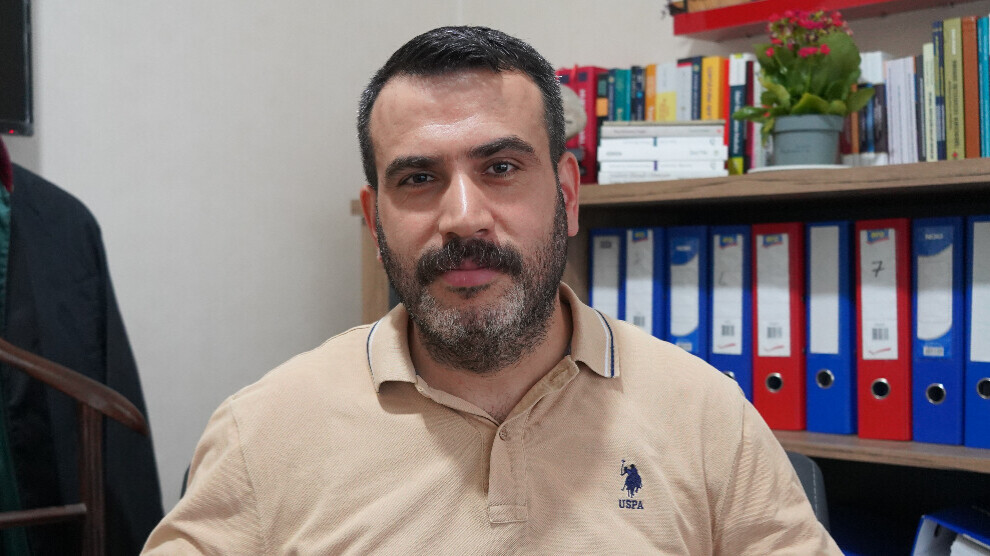Lawyer Çakaş: The right to hope is the path to peace
Lawyer Yusuf Çakaş said that Öcalan’s physical freedom must be secured for the process to move forward, and steps on the right to hope will pave the way for lasting peace.
Lawyer Yusuf Çakaş said that Öcalan’s physical freedom must be secured for the process to move forward, and steps on the right to hope will pave the way for lasting peace.

In 2014, the European Court of Human Rights (ECtHR) ruled that the aggravated life sentence imposed on Abdullah Öcalan without the possibility of release violated Article 3 of the ECHR, which prohibits torture. While the court determined that Öcalan's "right to hope" must be ensured, no legal regulations have been implemented in the 11 years since the ruling. As a result, Öcalan’s lawyers, along with various rights and legal organizations, submitted notifications to the Committee of Ministers of the Council of Europe (CoE), which is responsible for monitoring the implementation of ECtHR rulings. In its most recent meetings held on September 17-19, the Committee issued a warning to Turkey, giving a deadline until September 2025 to enact the necessary legal regulations and stating that it would issue an interim resolution for the first time. With the ongoing process for a democratic solution to the Kurdish question, Öcalan's "right to hope" has once again come to the forefront. Yet, no concrete steps have been taken regarding the "right to hope" so far.
Speaking to ANF, Yusuf Çakaş, a member of the Prison Commission of the Association of Lawyers for Freedom (ÖHD) Amed (Diyarbakır) Branch, said: “There are two types of penalties in the world. One is a sanction imposed for committed crimes; the other is the approach taken by governments and states toward political prisoners whom they do not consider as part of themselves. Throughout history, the world has witnessed the execution of thinkers, politicians, revolutionaries, and activists who did not share the same discourse as those in power.
The process in which we are discussing the 'right to hope' is actually related to the abolition of the death penalty, transition to the aggravated life sentence system, and complete elimination of the right to conditional release. It must be viewed within this framework. In Turkey, the death penalty was applied until a certain period. Later, although death sentences continued to be handed down, they were not implemented for a time. Then came the process of Abdullah Öcalan's capture and extradition to Turkey, his trial, and the imposition of a death sentence. Subsequently, within the framework of the European Union harmonization laws, the death penalty was abolished and converted into aggravated life imprisonment. Along with this, the right to conditional release was entirely eliminated. The 'right to hope' refers to the principle that everyone should have the possibility of release from prison one day.”
Recognizing the right to hope will resolve many issues
Çakaş pointed out that a special execution regime is applied to political prisoners in Turkey and said: “Under the current system in Turkey, prisoners sentenced to aggravated life imprisonment are never released from prison, which stems from the legal definition of ‘terrorism.’ We are talking about a special execution regime applied to those convicted under what is classified as organized crime. This practice is unacceptable. We have been discussing this issue for a long time. Everyone has long debated the scope and necessity of the 'right to hope.' Over the years, we have discussed the ‘right to hope,’ isolation, and how the isolation practiced in Imrali Prison has been extended to the entire prison system. Isolation must be understood within this framework.
At this point, we have witnessed the leader of the nationalist opposition, Devlet Bahçeli, personally bringing up the 'right to hope' in parliament. In the past, he was disturbed even by the discourse of ‘Mr. Abdullah Öcalan’, and he now refers to him as the ‘Founding Leader Abdullah Öcalan.’ It is important to recognize that the atmosphere is changing. It is in this atmosphere that the 'right to hope' must be discussed, and what actions Turkey should take at this stage. In September, the Committee of Ministers granted a one-year period. We do not consider the repeated extensions of this deadline by the Committee of Ministers to be healthy. The process has changed with the February 27 call (made by Öcalan). We are in a historic period and speaking about a resolution to the Kurdish question. The recognition of the 'right to hope' in the person of Abdullah Öcalan does not merely mean that Öcalan himself will benefit. When the 'right to hope' is recognized in his case, it will lead to the comprehensive resolution of the Kurdish question, democratization, progress in human rights, and, as Abdullah Öcalan himself has stated, solutions to economic and related issues.”
Öcalan must be free
Çakaş emphasized that in order for the process to move forward, Abdullah Öcalan’s physical freedom must be ensured. He concluded, “The fact that both Devlet Bahçeli and we persistently speak of the ‘right to hope’ means that implementing this right and improving Abdullah Öcalan’s conditions will lead to the construction of peace in these lands. The implementation of the ‘right to hope’ is the solution to all issues. We must approach this matter with the utmost seriousness and urgency. We are in a period filled with excitement and high morale. A peace-building process is possible, and the ‘right to hope’ is the path toward building peace. Since 1993, Abdullah Öcalan has pursued a process of peace-building and constructing a democratic society. This process aligns with that vision. The ‘right to hope’ is indispensable for the construction of a democratic society. There is a strong public expectation in this regard. What is being built here is brotherhood and a democratic society. And the path to this is Abdullah Öcalan’s physical freedom.”